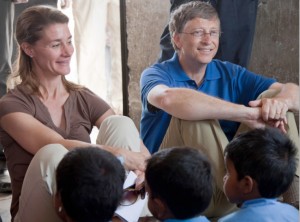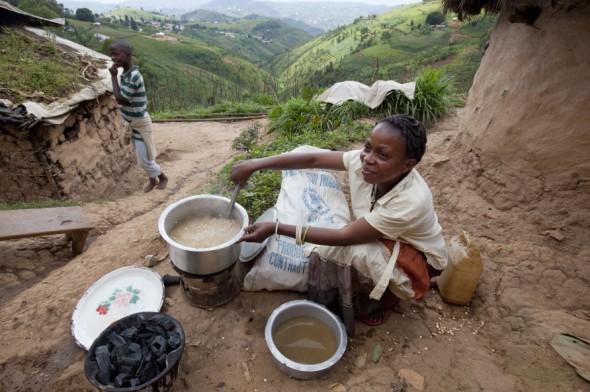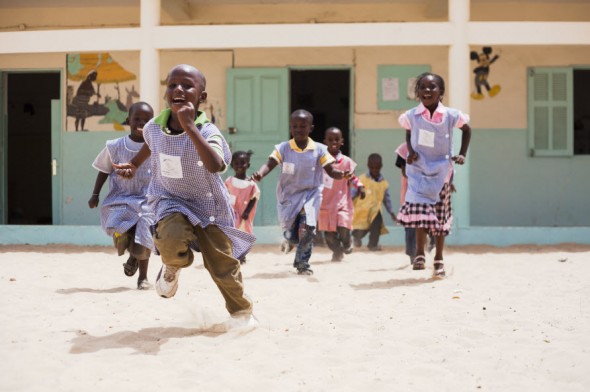
Hope and Good News for Africa as Bill Gates debunks Myths
Philanthropist and Microsoft co-founder Bill Gates – and his wife Melinda – have attempted to debunk three myths that they believe block progress for the poor. The couple tackled these myths in their annual Gates Foundation newsletter which was published last week. For those who haven’t seen the letter…or who simply don’t have the time […]

Philanthropist and Microsoft co-founder Bill Gates – and his wife Melinda – have attempted to debunk three myths that they believe block progress for the poor. The couple tackled these myths in their annual Gates Foundation newsletter which was published last week.
For those who haven’t seen the letter…or who simply don’t have the time to read it all, here’s our Lazy Reader’s Guide to the Gates’ Very Important Letter (important particularly for its references to Africa):

(Jamsaut, India, 2011) Photo: GatesFoundation.org
Firstly, these are the three Myths:
1. Poor countries are doomed to stay poor
2. Foreign Aid is a waste
3. Saving lives leads to over-population
And here, in a nutshell – according to Mr and Mrs Gates, and based on their knowledge and experience since forming the Gates Foundation 14 years ago – is why those myths are unfounded:
MYTH: Poor Countries Are Doomed to Stay Poor
The fact is, incomes and other measures of human welfare are rising almost everywhere, including in Africa.
– Bill Gates
- Africa is better off today than it was 50 years ago.
- Income per person has risen in sub-Saharan Africa (and elsewhere) and has climbed by two thirds since 1998 to nearly $2,200.
- Seven of the 10 fastest-growing economies of the past half-decade are in Africa!
- Africa has made big strides in health – a woman’s lifespan in sub-Saharan Africa has risen from 41 to 57-years-old (and would be 61 if it weren’t for HIV), since 1960…
- …and there’s been great improvement in education in Africa: over 70 % of children are in school now, compared to around 40% in 1970.
If getting enough to eat, going to school, and living longer are measures of a good life, then life is definitely getting better [in Africa]. These improvements are not the end of the story; they’re the foundation for more progress.
– Bill Gates
- Look “skeptically at anyone who treats an entire continent as an undifferentiated mass of poverty and disease.” The annual income in Ethiopia is only $800 per person; whilst in Botswana it’s nearly $12,000. Same continent. Different incomes.
- Some ‘developing’ nations have now developed, with more on the way. And those who are still finding their way have good, productive neighbours to learn from.
- Gates predicts that “by 2035, there will be almost no poor* countries left in the world.”
- Countries will benefit from innovations like “new vaccines, better seeds, and the digital revolution.”
- Their labour forces – buoyed by expanded education – will attract new investments.
- A few countries will be held back by war or geography (like land-locked nations in Central Africa). Inequality will persist but MOST will live in countries that are self-sufficient.
- More than 70 percent of countries will have a higher per-person income than China does today.
- And yes, the development of poorer nations could lead to other issues like increased pollution, but as more people are educated they will contribute to solving these problems.
When I was born, most countries in the world were poor. In the next two decades, desperately poor countries will become the exception rather than the rule,” he says. “Billions of people will have been lifted out of extreme poverty. The idea that this will happen within my lifetime is simply amazing to me.
– Bill Gates
MYTH: Foreign Aid is a Waste

- Negative articles that give the impression that aid doesn’t work use “big generalisations based on small examples” and give a distorted view.
- Since starting the Gates Foundation, Bill and Melinda have witnessed firsthand the impact of programmes they and the donor governments have funded. And what they see “is people living longer, getting healthier, and escaping poverty”.
- This myth just gives politicians an excuse to cut back on aid…which means fewer lives are saved and a country’s journey to self-sufficiency is delayed.
- No programme is perfect and aid is only one of many tools required to fight poverty and disease BUT broadly speaking it is a “fantastic investment” and we should be doing more.
- Contrary to myth, governments do not spend a lot on aid. The USA allocates less than 1 % of their budget to foreign aid. And even the most generous country in the world – Norway – only spends 3 % of their budget on foreign aid.
- Aid helps children become healthier…and then they don’t just survive. They go to school, they work, and eventually they help make their country more self-sufficient.
- The most common stories fuelling this myth surround the scandals about the amount of funds that are wasted on corruption. While of course we need to “root out fraud and eliminate waste”, the relative size of the problem is very small…and we should not give up on aid and saving lives because of small-scale corruption.
- Technology will help in the fight against corruption.
- It’s not true that giving a country aid makes it dependent on outsiders. Many countries, including Botswana and Mauritius, have grown so much together with aid, that today they receive hardly any. South Korea once received “enormous amounts of aid” and is now a net donor.
- Instead of discussing whether aid works, we should spend more time talking about how it can work better.
Health aid is a phenomenal investment. When I look at how many fewer children are dying than 30 years ago, and how many people are living longer and healthier lives, I get quite optimistic about the future.
– Bill Gates
MYTH: Saving Lives leads to Overpopulation

- Refer to the above points, and it becomes clear that as poor countries develop (sometimes with the help of foreign aid), people become healthier and gain access to better education. These people usually delay having children for longer , become more educated, and learn more about family planning…which leads to less overpopulation.
“It makes sense that people are concerned about whether the planet can continue to sustain the human race, especially in the age of climate change. But this kind of thinking has gotten the world into a lot of trouble. Anxiety about the size of the world population has a dangerous tendency to override concern for the human beings who make up that population.”
– Melinda Gates
- Birth rates have fallen in most of the world.
- The population is growing fastest where the most children are dying, such as in Afghanistan.
- When children survive in greater numbers, parents decide to have smaller families.
- The planet does not thrive when the sickest are allowed to die off, but rather when they are able to improve their lives.
Saving lives doesn’t lead to overpopulation. In fact, it’s quite the opposite. Creating societies where people enjoy basic health, relative prosperity, fundamental equality, and access to contraceptives is the only way to secure a sustainable world. We will build a better future for everyone by giving people the freedom and the power to build a better future for themselves and their families.
– Melinda Gates - Women’s empowerment – by delaying the age of marriage and increasing their level of education – makes a great difference. In a recent study of 30 developing countries, women with no schooling had three more children on average than women who attended high school.
We make the future sustainable when we invest in the poor, not when we insist on their suffering.
– Melinda Gates
And the last word…from Bill Gates:
“We hope you will help get the word out on all these myths. Help your friends put the bad news in context. Tell political leaders that you care about saving lives and that you support foreign aid. If you’re looking to donate a few dollars, you should know that organizations working in health and development offer a phenomenal return on your money. The next time you’re in an online forum and someone claims that saving children causes overpopulation, you can explain the facts. You can help bring about a new global belief that every life has equal value.”
Download the Gates Annual Newsletter PDF for more detailed info, photo and diagrams
(*meaning that almost no country will be as poor as any of the 35 countries that the World Bank classifies as low-income today).
